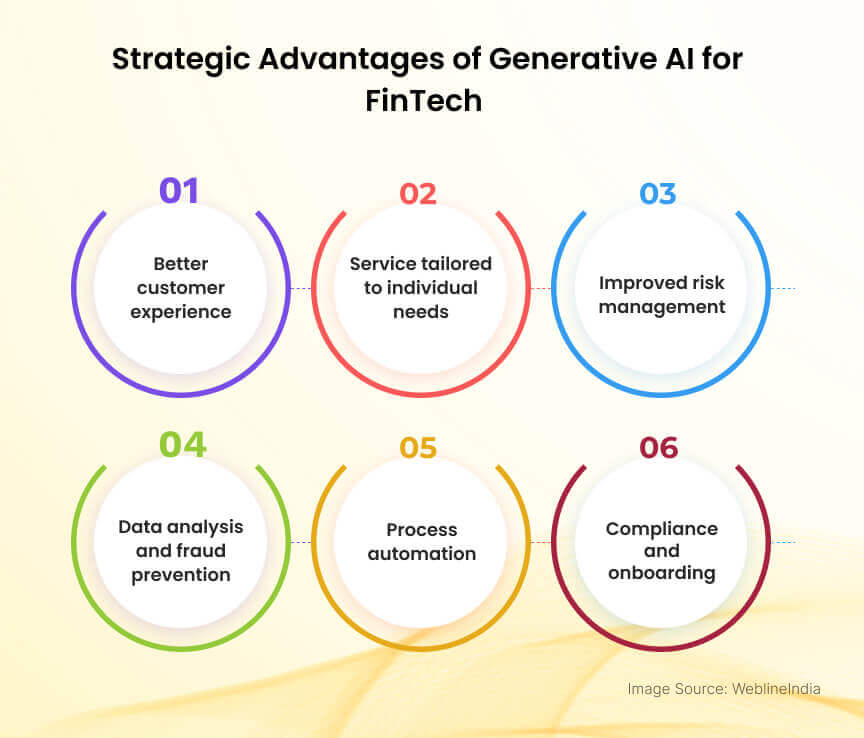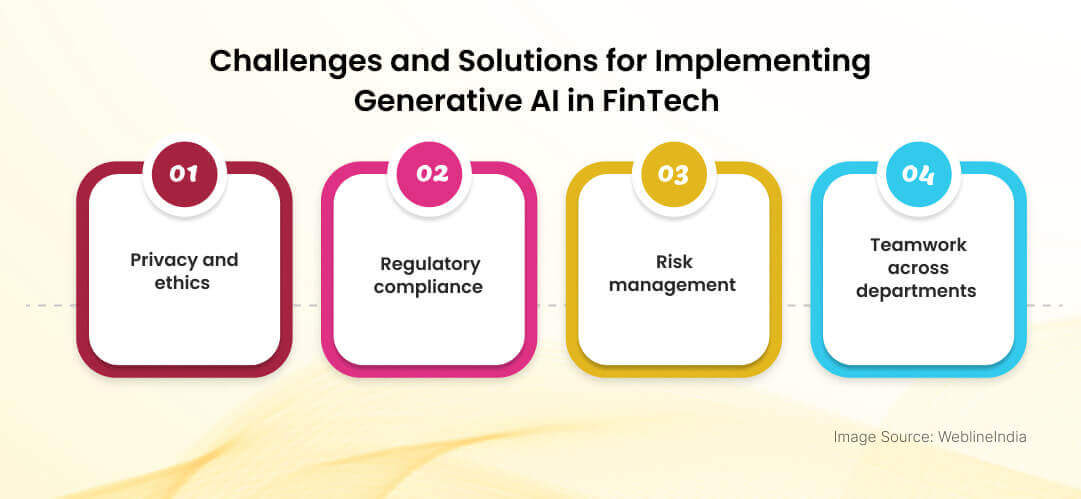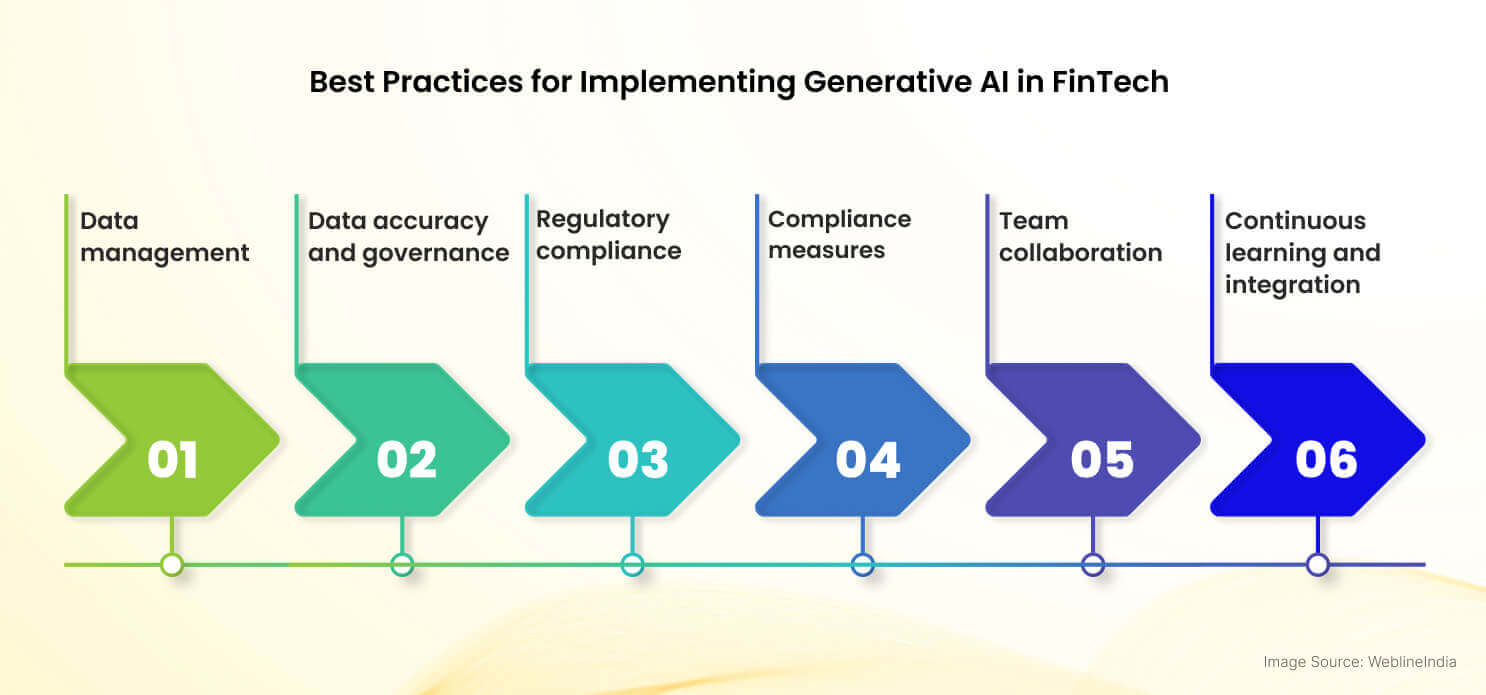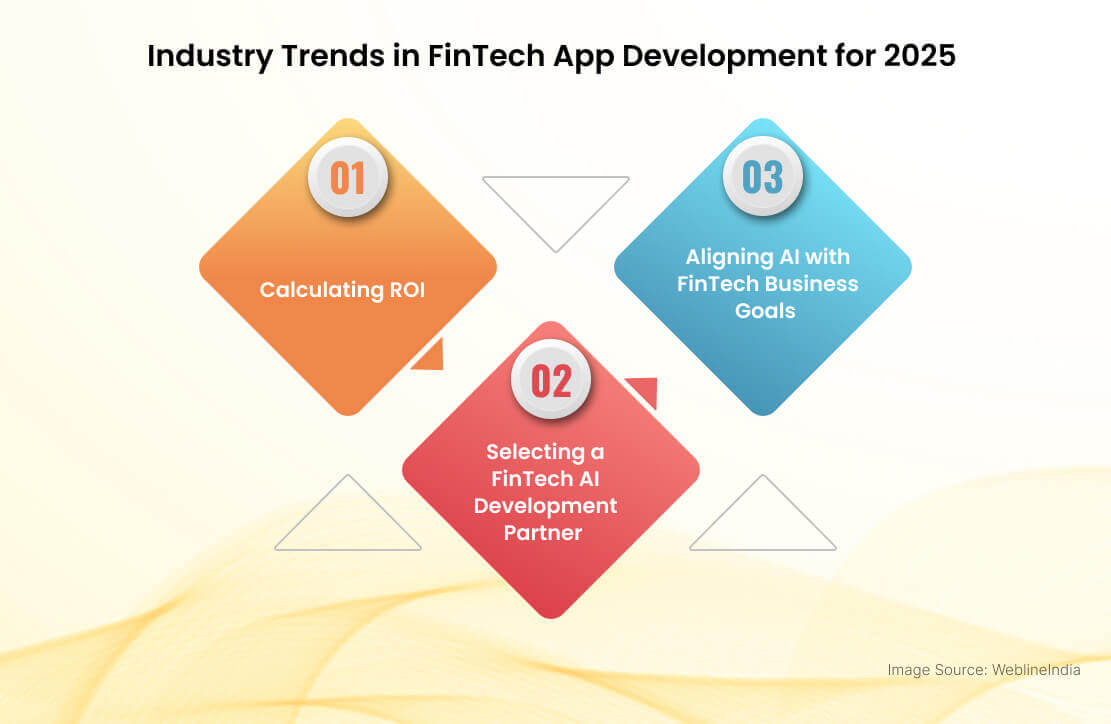Generative AI is revolutionizing the FinTech industry by enhancing customer experiences, driving innovation, and improving risk management. This article serves as a practical guide for FinTech CXOs, exploring the benefits and strategic advantages of integrating generative AI in FinTech. We will discuss how AI can streamline processes, personalize financial products, and bolster fraud detection. Ultimately, these advancements lead to better customer satisfaction and retention.
Join us as we delve into the transformative potential of Generative AI in FinTech, highlighting key statistics, market trends and best practices for successful implementation.
Generative AI in FinTech: Overview
Generative AI is changing how FinTech operates by making processes more efficient, improving customer experiences, and driving product innovation. Financial institutions are under pressure to offer personalized services, and Generative AI helps meet these needs effectively. It is also crucial in fraud detection and managing risks, which helps FinTech companies protect sensitive data and reduce fraudulent activities. By simplifying operations, Generative AI makes services faster and more responsive, resulting in better customer retention and satisfaction.
Benefits of Generative AI in FinTech
Better Efficiency and Customer Experience
Generative AI makes operations more efficient by automating routine tasks and optimizing workflows. This means financial service providers can offer personalized services, leading to higher user satisfaction. By reducing human error and offering round-the-clock services, customer experiences improve, resulting in higher engagement and loyalty.
Increased Consumer Trust and Adoption
More customers are willing to use AI-based financial services, which drives the growth of Generative AI in FinTech. As consumers grow more comfortable with these tools, companies can scale faster to meet their expectations, introducing more advanced services along the way.
Improved Customer Service
AI-powered chatbots and virtual assistants provide faster and more accurate answers to customer questions. These tools can handle a wide range of customer needs—from simple questions to complex support tasks—leading to better satisfaction and loyalty.
Product Innovation through AI
FinTech companies can use Generative AI to develop new and customized products that address specific customer needs. Examples include personalized insurance plans, investment portfolios, and payment systems that adapt to individual behavior. AI-driven innovation helps companies stand out in a crowded market.
Enhanced Fraud Detection and Risk Management
AI can analyze large amounts of data to detect unusual activities, making it essential for preventing fraud and managing risks. Generative AI constantly monitors transactions and flags anything suspicious in real-time, allowing institutions to manage risks before they become significant problems.
Personalized Financial Products
Generative AI allows institutions to create personalized products, such as custom loan options or savings plans. These products are based on an individual’s financial history, preferences, and goals. Personalization improves customer satisfaction and builds trust.
Streamlined Operations
Automating repetitive tasks like document verification and transaction monitoring allows FinTech companies to work more efficiently. Generative AI reduces the time and cost involved, enabling faster, more reliable services. It also lets human employees focus on more strategic tasks, boosting overall productivity.
Ready to revolutionize your FinTech strategy with smarter decisions and enhanced customer experiences, all backed with AI?
Key Statistics Highlighting the Role of Generative AI in FinTech Growth
The global FinTech market was valued at over $226 billion in 2023, with projections to reach $324 billion by 2026.
65% of financial services firms reported regular use of AI in 2024.
The market size of Generative AI in financial services is expected to grow from 1.09 billion U.S. dollars in 2023 to over 12 billion U.S. dollars by 2033.
The AI in fintech market is expected to grow from $11.35 billion in 2023 to $39.44 billion in 2028.
Generative AI in FinTech Market: Scope and Outlook
The market for Generative AI in FinTech is growing rapidly as companies embrace digital transformation in AI across various areas. Growth is driven by advancements in AI, better fraud detection, and a demand for personalized services. FinTech companies use Generative AI to meet customer expectations, cut costs, and improve security, reducing fraud and building consumer trust.
Market Growth Trends
Generative AI in FinTech is set to grow as adoption spreads across different sectors. More companies are leveraging AI to stay competitive by enhancing services and reducing costs.
Adoption Across Sectors
Generative AI is being adopted in many FinTech areas, including payments, lending, and investments. Each sector uses AI differently, from automating loans to predicting market trends.
Fewer Fraud thanks to AI
AI-powered systems can monitor transactions in real-time, leading to fewer incidents of fraud. This has made financial services more secure and trustworthy.
Strategic Advantages of Generative AI for FinTech

Generative AI provides multiple strategic advantages for FinTech companies, opening up endless possibilities with AI for your business. By improving personalization, companies can offer services that meet unique customer needs. Real-time data analysis and automated fraud detection improve risk management. Automation of processes like document handling and compliance checks saves time and reduces mistakes.
- Better customer experience: AI helps deliver personalized financial services, leading to satisfied customers.
- Service tailored to individual needs: Financial services are customized based on user preferences, improving their experience.
- Improved risk management: AI helps manage risk through real-time monitoring and proactive detection of unusual activities.
- Data analysis and fraud prevention: AI continuously monitors transactions to detect anything out of the ordinary.
- Process automation: AI automates many back-office tasks, reducing manual work.
- Compliance and onboarding: Document processing and compliance are automated to save time and cut down on human errors.
Top Use Cases of Generative AI in FinTech Businesses
Predicting Market Trends for Investments
Generative AI can analyze large sets of data to predict trends, helping investors make better decisions.
Automated Investment Advice
AI provides automated financial advice that is tailored to individual risk profiles and goals, allowing customers to make well-informed investment choices.
Monitoring High-Frequency Trading
AI monitors high-frequency trading to detect irregularities and ensure compliance with regulations.
Personalized Financial Services
AI offers customized investment strategies and product recommendations based on user data.
- Customized investment strategies: AI offers recommendations that match an individual’s financial history and goals.
- Product recommendations: AI insights enable tailored product suggestions that are more likely to meet customer needs.
Fraud Detection and Prevention
AI monitors transactions in real-time, identifying unusual activity before it turns into fraud.
Real-time Fraud Monitoring
AI can quickly identify suspicious behavior by analyzing thousands of transactions per second.
Risk Management
Generative AI uses predictive analytics to evaluate risks and run scenario simulations.
Predictive Tools
AI helps anticipate risks by forecasting possible future events and their impacts.
Automating Compliance
AI automates the compliance process, ensuring all activities meet regulatory standards.
Enhanced Customer Interaction
AI-powered chatbots provide instant support, improving customer service.
Analyzing Customer Sentiment
AI analyzes customer feedback, allowing FinTech companies to improve their products and marketing.
Want to discover practical Generative AI applications to keep your FinTech business ahead?
Generative AI in Payments
Generative AI is playing an increasing role in the payment sector, especially with cloud-based technologies. These tools help improve payment processes, manage new industry standards, and support businesses by offering efficient payment methods.
Adopting Cloud Models
Multi-cloud and hybrid models offer scalability, making it easier to manage payments.
Faster Innovation through Composable Architecture
Using flexible systems allows for quicker upgrades and innovation.
Managing Industry Standards
AI helps financial services adopt new standards, such as instant payment requirements and digital currency testing.
Helping Small Businesses
AI simplifies payment systems for small businesses, making financial transactions faster and less costly.
Challenges and Solutions for Implementing Generative AI in FinTech

Integrating Generative AI into FinTech has its challenges. Issues include data privacy, ethical concerns, and meeting regulatory standards. Companies must have strong data management systems in place and ensure they follow all regulations. Cross-team collaboration is also important for solving these challenges effectively.
Privacy and Ethics
It is crucial to manage how data is collected, used, and protected.
Regulatory Compliance
AI must operate within legal frameworks to ensure data security and regulatory compliance.
Risk Management
Identifying potential risks and putting strategies in place to address them is essential.
Teamwork Across Departments
Collaboration between IT, compliance, and operations teams is necessary for successful implementation.
Best Practices for Implementing Generative AI in FinTech

- Data management: Accurate and well-managed data is necessary for AI systems to function properly.
- Data accuracy and governance: Companies need reliable data and strong management practices.
- Regulatory compliance: Following regulations builds customer trust and prevents legal issues.
- Compliance measures: AI systems need features to ensure they meet all regulatory standards.
- Team collaboration: Successful AI implementation requires all teams to work together.
- Continuous learning and integration: Cross-functional collaboration and staying updated are key to success.
The Future of Generative AI in FinTech
Generative AI will continue to shape the future of FinTech. The focus will be on better customer interactions, more advanced fraud detection, and highly personalized services. These advancements will create new opportunities for innovation in financial services.
- Trends in AI: Generative AI will be used more for personalization, risk management, and customer service.
- Future developments: There will be greater emphasis on AI’s role in customer interactions and predictive tools.
- Long-term changes: AI integration will change how financial services are provided, making them more efficient and user-focused.
ROI Considerations for Generative AI Initiatives

Evaluating the return on investment (ROI) for AI initiatives is crucial. Companies should look at potential benefits like cost savings, efficiency gains, and customer satisfaction. Choosing the right development partner is also vital for achieving the best ROI.
Calculating ROI
Assessing the value created by AI before implementing it is essential. This includes practical examples such as identifying cost reductions, improved efficiency, enhanced customer satisfaction, and making sure AI projects align with business objectives.
Selecting a FinTech AI Development Partner
It’s crucial to select an expert and trusted partner with a deep understanding of FinTech needs. A partner like WeblineIndia can make a significant difference by bringing proven expertise in AI integration, understanding complex financial systems, and delivering customized solutions that align perfectly with your business goals. With our years of experience in the FinTech domain, WeblineIndia ensures that your AI projects are executed seamlessly, efficiently, and with a focus on tangible business outcomes.
Aligning AI with FinTech Business Goals
For AI initiatives to make a real difference, they must be closely aligned with the company’s core business objectives. This means identifying the specific problems AI can solve and ensuring those align with strategic goals, such as improving customer satisfaction, reducing operational costs, or gaining a competitive edge. It’s important to involve key stakeholders across departments to set clear, measurable outcomes for AI projects. Regular evaluations are essential to make sure the AI systems are on track and delivering value that contributes directly to the broader business mission.
How can WeblineIndia help you integrate Generative AI in your FinTech Business?
We offer a variety of services to help FinTech companies incorporate Generative AI. Our expertise includes improving efficiency, enhancing customer experience, and ensuring compliance. We have successfully helped clients leverage AI technology for better business outcomes. We provide AI integration, machine learning, custom software development, digital transformation, and consulting for FinTech.
Our Expertise in FinTech Software Development
We have extensive experience in using AI to improve customer engagement, driving product development, optimizing operational efficiency, and supporting market growth. Our expertise also includes creating custom solutions for financial risk assessment, fraud prevention, and providing personalized financial services. By leveraging advanced AI tools, we help our clients achieve seamless digital transformation that aligns with evolving customer expectations and industry standards.
- Case Study 01: WeblineIndia worked with a FinTech company to implement an AI-powered email generator that significantly increased customer engagement and revenue. The AI-driven system allowed for highly personalized email campaigns, which directly addressed customer needs and preferences, leading to better conversion rates. You can find more details about this case study on our website here.
- Case Study 02: Our offshore development team collaborated with a BFSI startup to create a bill-sharing app. This app allowed users to seamlessly split bills, which helped the startup gain rapid traction in the market. By using an agile approach, we ensured quick iteration and deployment, ultimately leading to significant business growth.
Key Takeaways
Generative AI can significantly improve efficiency, personalization, and fraud prevention in the FinTech industry. Successful AI implementation relies on good data practices, regulatory compliance, and collaboration across departments.
Generative AI is changing the way financial services operate by allowing institutions to offer highly personalized customer experiences and making their processes more efficient. By using AI to analyze customer data, financial institutions can better understand individual needs and provide tailored solutions.
AI also optimizes workflows by automating routine tasks, reducing human errors, and speeding up service delivery. These improvements lead to a more responsive and engaging experience for customers, ultimately helping financial services build trust and foster long-term relationships.
Recommendations for FinTech CXOs
To effectively implement AI in your organization, focus on a few critical areas. First, ensure that your data is accurate and well-organized, as high-quality data is the foundation for all AI processes. Second, prioritize regulatory compliance by staying updated with the latest financial regulations and embedding compliance checks within AI systems. Finally, foster collaboration across departments—teams such as IT, compliance, and operations must work together seamlessly to leverage AI’s full potential and avoid common pitfalls.
Frequently Asked Questions
What is Generative AI in FinTech?
Generative AI in FinTech involves using AI to create financial products, manage risks, and improve customer service.
What are the challenges of adopting Generative AI in financial services?
Key challenges include data privacy, ethical issues, and ensuring compliance with regulations.
How does Generative AI improve fraud detection?
Generative AI monitors transactions in real time, recognizing unusual patterns that may indicate fraud.
How is AI used in FinTech?
AI is used for fraud detection, customer service through chatbots, automated investment advice, and creating personalized solutions. It processes large amounts of data quickly, leading to better decisions.
What is the future of FinTech with AI?
AI will help make financial services more personalized, detect fraud more effectively, and streamline transactions. It will also help institutions meet regulatory standards more efficiently.
Social Hashtags
#GenerativeAI #FinTechInnovation #AIinFinance #CXOInsights #FinTechLeadership #FutureOfFinance #AIforCXOs #TechForCXOs #FinTechTrends #AIinFinTech #FinTechFuture
Testimonials: Hear It Straight From Our Customers
Our development processes delivers dynamic solutions to tackle business challenges, optimize costs, and drive digital transformation. Expert-backed solutions enhance client retention and online presence, with proven success stories highlighting real-world problem-solving through innovative applications. Our esteemed clients just experienced it.










